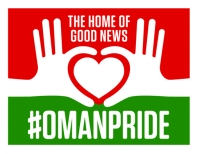
For Tariq Al Khabouri, humanity and charity always come first. Starting with such initiatives in the late 1980s, he has never looked back since, and one day aims to see the disabled being treated as normal, active and productive members of society. One of his earliest fundraising initiatives for the disabled was to launch a magazine and generate money to buy wheelchairs for them, "Back in the 1980s, many people didn’t have a clue on how to raise funds, so I suggested that we take out a magazine, and everybody was sceptical if companies would pay for the advertisements or not. I officially joined the magazine in 1986 under the presidency of Sheikh Saud Al Rawahy, he was the ex-president of the Oman Athletic and Football Associations."
"This magazine got approved in 1986, and we collected OMR6,000 from advertisements and that was (like creating) a ‘wonder of the world.’ With that money, Al Rawahy and the rest of the committee members bought wheel chairs for the handicapped, and this is how we started." Later in 1991, Al Khabouri started an association with the "Welfare for the Handicapped Association."
"In 1991, I met with Barka Al Bakry and she asked me to join the association, it was the first officially recognised association for handicapped children. Again when I took over as a treasurer I only had OMR1,000 and then we started doing small fundraising programmes to meet our financial commitments, such as rent and electricity, and other expenses."
As he was so inclined to voluntary initiatives, new ideas kept flowing to him and one day when Al Khabouri was sitting at the association, he thought of an idea. “I sat and wondered, these kids mostly suffer from Down’s Syndrome and are mentally challenged; I thought if we give them colours, what will they do? So one of the NGO persons from New Zealand, her name was Sherry and she said that we didn’t have enough money to do that.”
“So the first expense I paid was OMR30, we bought the colours and materials and the children held them and drew and coloured, and then we held a small exhibition displaying these artworks and out biggest buyers were the Zubair Corporation, Mohsin Haider Darwish, Bank Al Ahli (which is now Bank Muscat), KPMG, and Tawoos.” When the association was in dire need of funds to build a place, Al Khabouri came to their rescue. “We had this huge task to improve the handicap school centre in Quriyat, because we didn’t have a place to keep the kids, the centre started under a tree in the late 80s, so Al Bakry spoke to me and we met His Highness Sayyid Barghash Al Said, who was the deputy governor of the capital.”
“We were grateful to Al Hassan, Oman Cement Company, and Sadolin Paints; these companies provided us with the building materials for free, and then we met this fine gentlemen named Juman Al Ashour; his company is Abu Hani, he sent his construction team to us and they built the centre.” This happened in the early 90s. “I had just met with the current president of the centre and she said that she was so proud to see me, and speak to me and she also said that the women in Quriyat, the ones who were employed by us, they still ask about me.”
During his charity ventures, Al Khabouri once met a German woman, who was not sure as to how she should organise extreme sports activities in Oman, and so she approached Al Khabouri. “I assisted them with the organisation and it was from Muscat to Sharqiyah Sands, all the participants came from Germany and larger Europe. So when this event was over she asked if we could do something on disabled diving, and I had no clue how that would be.”
Al Khabouri gave the idea much thought and then met with Dr Ali Al Sunaidy, who was then the minister of sports. “He called me after three months and gave me the green light, and then for the first time in the Gulf, according to the International Association for Handicapped Divers, we did a project where we took physically challenged children into the open water.”
The participants were delighted. “They were all very happy, it was an entertainment for them, and also a physical exercise, so from 2009 till today, except in 2015 because of the weather problems, we organised this four times in Muscat and three times in Sohar, we also went to Nizwa and Salalah. Everywhere we have gone and done this activity, people have been overjoyed. This is also very helpful for the disabled (as in it aids) with movement of their muscles.”
Al Khabouri appealed to local swimming and diving instructors to come and assist with such activities. “It’s not easy organising these events alone, and we have instructors coming from abroad every time we organise these events, so I would appeal to local instructors to come and volunteer.”
Besides this, Al Khabouri also thinks that all the welfare associations and NGOs need to come together under one umbrella and work alongside each other. “It is my request to the Ministry of Social Development to help bring together these voluntary organisations; maybe they can have monthly meetings and see the progress, propose projects and work to build Oman.”
Al Khabouri is the grandfather of a lovely boy called Noah. “I love spending time with my little grandson, and he loves me and loves to go out with me, so all my free time is for him.” His dream is to see the disabled being treated as active members of society. “The main thing is that they should be considered as normal people, their parking spaces should be respected and they need to be respected as productive people.”